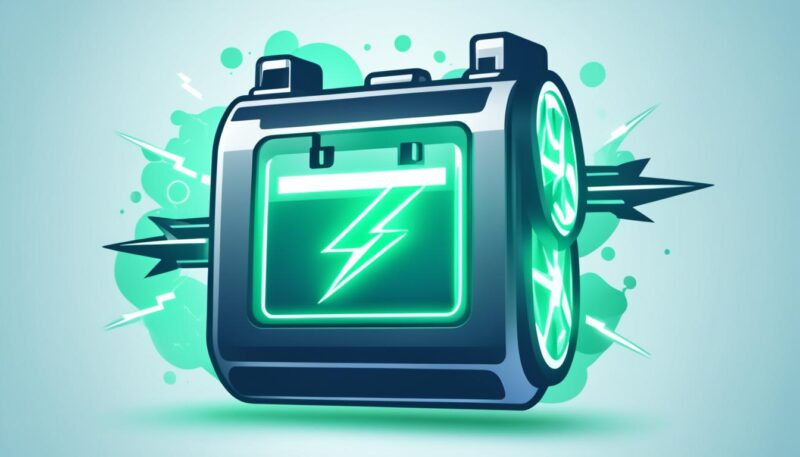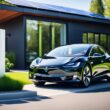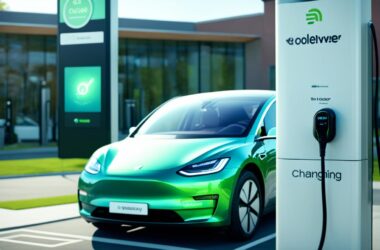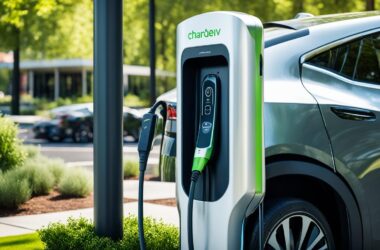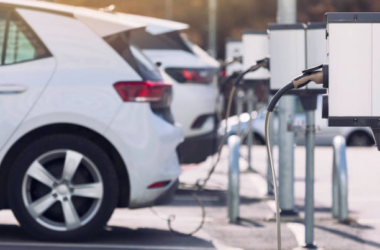The time it takes to charge an electric car can vary depending on factors such as the size of the battery and the speed of the charging point. A typical electric car with a 60kWh battery takes just under 8 hours to charge from empty to full using a 7kW charger. Rapid chargers, such as 50kW chargers, can add up to 100 miles of range in approximately 35 minutes. The bigger the car’s battery and the slower the charging point, the longer it takes to charge.
Key Takeaways:
- Charging an electric car with a 7kW charger takes approximately 8 hours for a typical 60kWh battery.
- Rapid chargers can add up to 100 miles of range in about 35 minutes.
- The charging time depends on the size of the battery and the speed of the charging point.
- The bigger the battery and the slower the charger, the longer it takes to charge.
- Consider using rapid chargers for quicker charging times, but they are less commonly available.
How Long Does It Take to Fully Charge an Electric Car?
The time it takes to fully charge an electric car depends on the size of the battery and the charging speed. For example, a Volkswagen ID.5 with an 82kWh battery can take 8 hours to charge from empty to full with a 7kW charger. The charging time may also be limited by the maximum charging rate of the electric vehicle.
Charging an electric car is influenced by multiple factors, including the size of the car’s battery and the speed of the charging point. A 7kW charger is a common charging option for many electric car owners. It offers a moderate charging speed that strikes a balance between convenience and efficiency.
It’s important to note that the charging time can vary depending on the specific make and model of the electric car. Some electric cars may have a maximum charging rate lower than 7kW, which can extend the charging duration.
When using a 7kW charger, it’s crucial to consider the battery size of your electric car. The larger the battery, the longer it will take to fully charge. For example, a compact electric car with a smaller battery may reach a full charge in a shorter time compared to a larger electric SUV with a bigger battery capacity.
| Electric Car Model | Battery Size | Charging Time with 7kW Charger |
|---|---|---|
| Volkswagen ID.5 | 82kWh | Approximately 8 hours |
| Nissan LEAF | 40kWh | Approximately 4 hours |
| Tesla Model S | 100kWh | Approximately 12 hours |
It’s worth noting that these charging times are approximate, and the actual duration may depend on various factors, such as the initial state of charge, temperature conditions, and individual vehicle specifications. Always consult the manufacturer’s guidelines and recommendations for the most accurate information regarding charging times.
How Fast Do Electric Cars Charge?
Rapid chargers are the fastest way to charge electric vehicles, offering high charging speeds that significantly reduce charging time. These chargers come in two main variants: 43-50 kW chargers and 150kW chargers. With the power of these chargers, electric car owners can quickly replenish their vehicle’s battery and continue their journey efficiently.
For example, a Nissan LEAF (2018) can be charged in 1 hour or less with a 43-50kW charger. This demonstrates the impressive charging speed these chargers offer, making it convenient for drivers to charge their electric cars during shorter stops.
On the other hand, home charging points usually have power ratings of 3.7kW or 7kW. While these chargers have slower charging speeds compared to rapid chargers, they are still highly effective in providing a full charge at home. The charging time at home can range from 4 to 11 hours, depending on the specific model of the electric car.
Choosing the right charging option depends on various factors such as the urgency to recharge, the availability of charging points, and the driver’s charging needs. Rapid chargers are ideal for quick charging needs, while home charging points offer convenience and are a cost-effective solution for regular charging.
Benefits of Rapid Charging
“Rapid chargers provide the convenience of quick charging, allowing electric car owners to charge their vehicles in a shorter amount of time. This is particularly useful for long journeys or when time is limited. With rapid chargers, drivers can add significant range to their electric cars in just a matter of minutes.”
In summary, electric cars can be charged at impressive speeds using rapid chargers, enabling shorter charging times and offering greater flexibility for electric vehicle owners. While home charging points have slower charging speeds, they still provide an efficient and cost-effective way to charge an electric car overnight or during extended periods of parking.
How Long Does It Take to Charge an Electric Car at a Charging Station?
The charging time at a charging station can vary depending on the charger’s speed. A typical electric car can be charged in as little as 30 minutes or less at a 150kW rapid charging station. Using a 7kW public charger can take under 8 hours, while a 22kW charger can take around 3 hours.
If you need a quick top-up charge while you’re out and about, a rapid charging station is your best option. These stations can charge your electric car much faster, allowing you to get back on the road in no time. However, please note that not all charging stations have rapid chargers, so it’s essential to plan your route accordingly.
For longer charging sessions, such as overnight or during the workday, a 7kW public charger is a convenient choice. While it may take a bit longer to fully charge your electric car, it provides a reliable and steady charging speed. This allows you to leave your car charging while you attend to other activities, ensuring that it’s ready to go when you need it.
Table: Charging Time at Different Charging Stations
| Charging Station Type | Charging Speed | Approximate Charging Time for a Typical Electric Car |
|---|---|---|
| Rapid Charging Station | 150kW | 30 minutes or less |
| Public Charger | 7kW | Under 8 hours |
| Public Charger | 22kW | Around 3 hours |
It’s important to note that the charging speed may also depend on the specific electric car model and battery capacity. Always refer to your car’s manual or manufacturer’s recommendations for the most accurate charging time estimates.
How Long Does It Take to Charge an Electric Car at Home?
Charging an electric car at home with a 7kW charger typically takes just under 8 hours. This is the most convenient and cost-effective way to charge an electric car. A slower home charger rated at 3.7kW would take around 16 hours to fully charge the same car. 22kW home chargers are available but are rarely used due to the need for three-phase power.
| Charger Type | Charging Time |
|---|---|
| 7kW Charger | Just under 8 hours |
| 3.7kW Charger | Around 16 hours |
| 22kW Charger | Varies, rare due to three-phase power requirement |
Charging your electric car at home provides the convenience of having a fully charged vehicle each morning, without having to rely on public charging stations. With a 7kW charger, you can charge your car overnight and wake up to a full battery, ready for your daily commute.
It’s important to consider the charging speed of your home charger when purchasing an electric car. If you frequently require a full charge within a shorter time frame, a faster charging option might be more suitable.
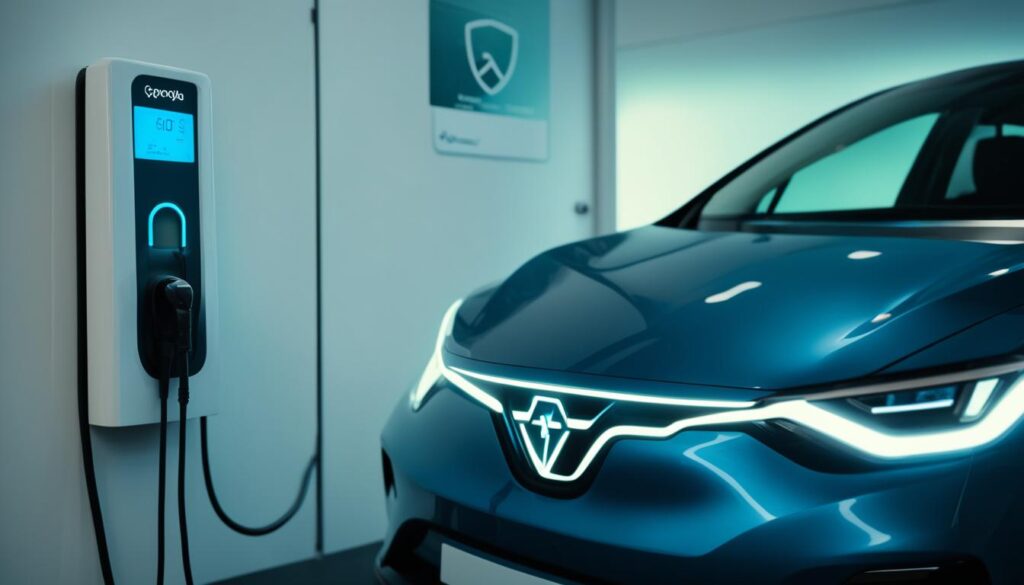
Having a dedicated home charging station eliminates the need to visit public charging stations regularly, saving you time and ensuring your car is always ready for your next journey.
What is Top Up Charging?
As an electric car driver, I’m always looking for convenient ways to keep my vehicle charged and ready to go. That’s where top up charging comes in. It’s a smart and practical practice that allows me to plug in and charge my car whenever I park, whether it’s overnight at home or during the day while running errands. By taking advantage of every opportunity to charge, I can ensure that my battery is always topped up and avoid the need for a full recharge. It’s a simple way to maintain a healthy charge level and stay on the road without any range anxiety.
Public and workplace charging points play a key role in facilitating top up charging. These charging stations typically offer a range of power outputs, commonly ranging from 7kW to 22kW. This makes them ideal for topping up your electric car’s battery whenever you have the chance. Whether you’re grabbing groceries at the supermarket or spending time at work, you can conveniently plug in and add some extra juice to your car’s battery. It’s like giving your car a quick boost, ensuring that you have enough range for your next journey.
Aside from the convenience factor, top up charging also ensures that you make the most of your time by maximizing your charging efficiency. Instead of waiting for a full recharge, which can take several hours depending on the battery size and charging rate, top up charging allows you to add range to your electric car in shorter bursts. This way, you can make the most of your time while still keeping your battery level comfortable.
“Top up charging is a game-changer. It allows me to effortlessly keep my electric car charged without having to worry about finding a fast charger or waiting for a long charging session.”
So whether you’re at home, at work, or out and about, top up charging is an effective way to ensure that your electric car remains charged and ready for your next adventure. By taking advantage of public and workplace charging points and plugging in whenever you park, you can easily top up your battery and enjoy peace of mind knowing that you’re always prepared to hit the road.
Benefits of Top Up Charging
Here are some key benefits of top up charging:
- Convenience: Charge your electric car wherever you go, saving time and effort.
- Maximized Efficiency: Add range to your battery in shorter bursts, making the most of your charging time.
- Range Confidence: Ensure that you always have enough range for your next journey, reducing range anxiety.
- Cost-Effective: Take advantage of existing public and workplace charging points, avoiding costly rapid chargers.
| Charging Point | Power Output | Ideal for Top Up Charging |
|---|---|---|
| Home Charging Station | 7kW | Yes |
| Public Charging Station | 7kW – 22kW | Yes |
| Rapid Charging Station | 50kW – 150kW | No (Best for longer trips or urgent charging needs) |
How Much Range Do You Get Per Hour of Charging?
When it comes to electric car charging duration, understanding how much range you can expect to gain per hour of charging is essential. The optimal charging time for electric vehicles depends on various factors, including the efficiency of the car and the charging speed. Let’s delve into the details.
For small full battery electric cars charging at 7kW, you can typically expect to gain up to 30 miles of range per hour. This is a decent rate for those seeking a quick boost in their electric car’s range. However, keep in mind that the range per hour can also be influenced by environmental factors, such as temperature.
For larger electric cars charging at the same 7kW speed, you can typically anticipate around 20 miles of range per hour. Although this is slightly lower than smaller cars, it still allows for significant mileage gain during charging sessions.
Factors that Affect Range Per Hour of Charging
It’s worth noting that the efficiency of an electric car can vary based on several factors. Some of these include:
- Battery size and capacity
- Electric car model and make
- Driving behavior and style
- Climate and temperature
All these factors can play a role in the electric car charging duration and the range gained per hour of charging.
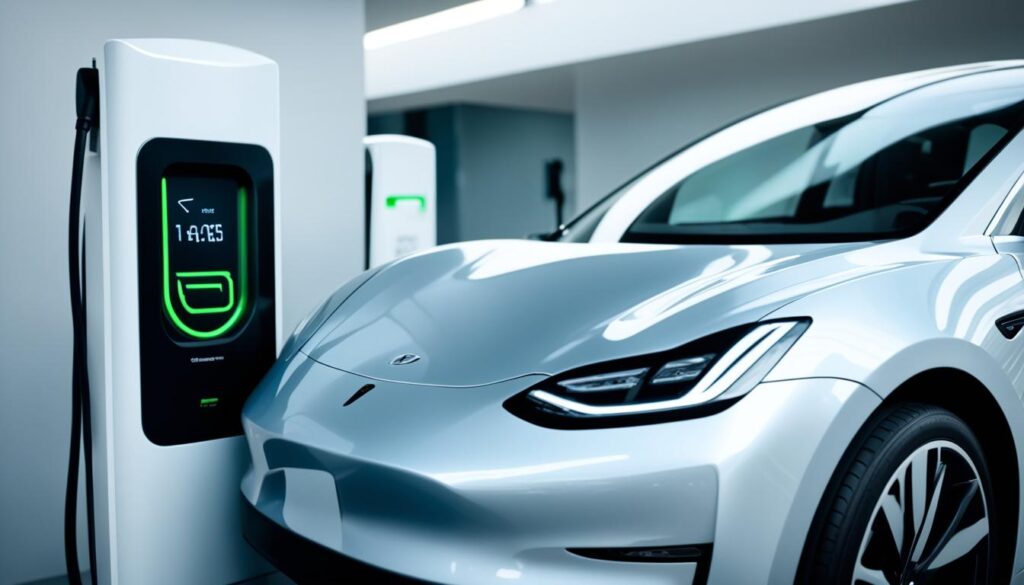
In order to better understand the range per hour of charging for different electric car models, refer to the table below:
| Electric Car Model | Range Per Hour of Charging at 7kW |
|---|---|
| Nissan Leaf | 25-30 miles |
| Tesla Model S | 15-20 miles |
| Volkswagen ID.4 | 20-25 miles |
Keep in mind that this table provides a general range estimation and individual experiences may vary based on factors like battery degradation, driving conditions, and temperature.
Conclusion
After considering the various factors that impact electric car charging duration, it is evident that charging an electric car with a 7kW charger can take approximately 4-8 hours. However, it is important to note that this timeframe can be influenced by variables such as battery size and charging rate. If faster charging times are desired, rapid chargers can be used, but they may not be as widely available.
For most electric car owners, charging at home proves to be the most convenient and cost-effective option. With home chargers typically rated at 7kW, it is possible to top up your electric car’s battery overnight and be ready to go in the morning. However, it is crucial to take into account external factors like temperature, as they can affect the overall charging time.
To ensure that your electric car is always charged and ready when you need it, planning ahead and utilizing top-up charging can be beneficial. Top-up charging allows you to take advantage of available charging infrastructure while you are parked at destinations such as supermarkets or workplaces. Public and workplace charging points, typically ranging from 7kW to 22kW, enable you to keep your battery topped up throughout the day, minimizing the need for lengthy recharging sessions.
In conclusion, understanding the charging duration and speed of electric cars is crucial for efficient management of your vehicle’s battery. By considering factors such as battery size, charging rate, and utilizing top-up charging, you can ensure that your electric car remains charged and ready to go on your journeys.





